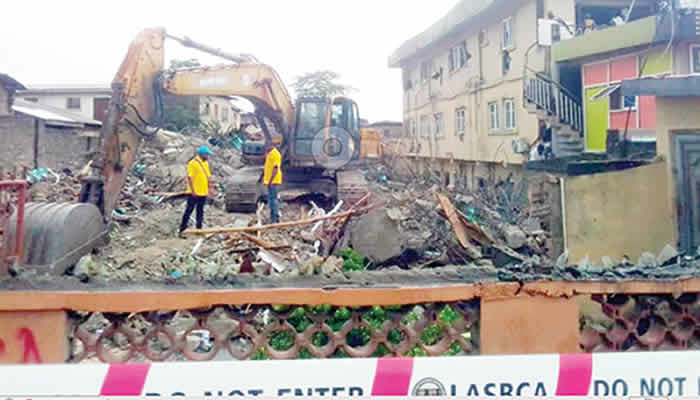Photo caption: Scene of the collapsed building
The bodies of 16-year-old Maleek, his 13-year-old sister Ameerah, and their 73-year-old uncle, known simply as Bolaji, were on Wednesday recovered from the rubble of a collapsed two-storey building in the Ota-Ona community of Ikorodu, Lagos State.
PUNCH Metro correspondents, who visited the scene of the incident located along Awolowo Road, gathered that the three victims were members of the same family.
The uncompleted structure, according to sources in the community, was being financed by a member of the family based in the United Kingdom, while the late septuagenarian was overseeing the construction in Nigeria.
Residents who spoke with PUNCH Metro on Wednesday disclosed that the building had been showing signs of structural weakness long before the collapse, which occurred on Tuesday.
While some blamed the site engineer responsible for the project, other residents said they were shocked by the incident.
As earlier reported by PUNCH Metro on Wednesday, 10 persons were rescued from the rubble by the Lagos State Fire and Rescue Service.
Findings by our correspondents, however, showed that all those rescued were site workers, while the three deceased were not part of the construction team.
A relative of the victims, Lanre Itameta, told our correspondent that the two teenagers were only at the site due to restrictions imposed by the ongoing Oro festival in the community.
Itameta said, “Bolaji, Maleek, and his sister, Ameerah, were the ones who didn’t make it. Maleek had just written this last UTME. It’s such a painful loss. All the construction workers survived.
“Yesterday (Tuesday) was the Oro traditional festival. As you know, women are not allowed to go out during the ritual. Maleek, who was 16, wanted to go to the mosque for afternoon prayers, but Ameerah, 13, begged him to stay and pray at home because she couldn’t go out.”
According to Itameta, the two were praying together under the uncompleted structure when it collapsed. Their uncle, Mr Bolaji (who was Itameta’s brother), was also crushed under the debris.
“My elder brother had just come to record the construction progress and send the video to our brother in the UK who was funding the project. Unfortunately, the building collapsed while he was there,” Itameta added.
A female neighbour, known as Adetunji, said the just-concluded Oro festival delayed rescue interventions from residents due to the restricted movement.
She said, “I was in my apartment with my children when we heard a loud rumbling sound. We rushed outside and saw that dust and sand from the debris had filled the area.
“But some residents stopped us, reminding us that the festival was ongoing and women shouldn’t be outside.”
Another resident, identified only as Hassan, recalled that the building had shown signs of distress.
“Before it collapsed, the building was shaking. We screamed because it felt like the wind would blow it down. A second later, we heard a loud crash,” he said.
A rescue official from the Lagos State Emergency Management Agency, who requested anonymity because he was not authorised to speak publicly, said the operation had concluded.
He said, “We’re not looking for anyone again. No one is missing. Everyone has been accounted for. We recovered three bodies, and 10 people sustained injuries.”
Speaking at the scene, the Lagos regional officer of the Council for the Regulation of Engineering in Nigeria, Tanmide Akinawo, lamented the lack of adherence to building regulations.
“This problem is like a hydra-headed monster. When you try to solve one part, another grows. It’s all rooted in corruption. People hate regulations and prefer to cut corners,” Akinawo said.
He added, “When professionals advise builders to follow the law, they often try to circumvent it. But the result is a disaster. If proper professionals, materials, and procedures are used, collapses won’t happen.”
Appealing for a widespread public orientation campaign, he urged the National Orientation Agency and state institutions to “educate the public on the consequences of cutting corners, on the loss of lives and tragedies like this one.
“Lagos is a huge city with a growing population. People want homes, either for residential or commercial purposes, but without proper oversight, tragedies like this will continue.
“Until people choose to do the right thing, building collapses will not stop,” he concluded.
This incident comes just a month after a similar tragedy in April, when a three-storey structure collapsed in the Ojodu Berger area of Lagos, killing five persons on the spot.
=== PUNCH ===



